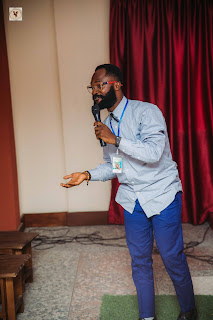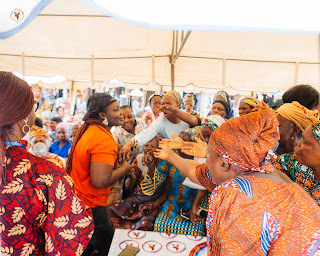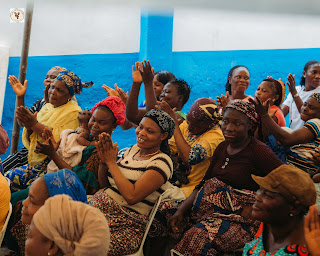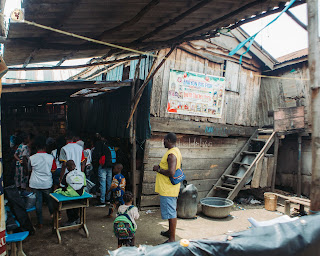In April 2025, the Institute For Liberty and Economic Education hosted their first ever Writer's fellowship in Ghana and I was honoured to be one of the facilitators at the fellowship. I had met the writers online initially and assessed their works. One of the works that caught my attention before meeting him Physically was that of Opare.
Osei wrote passionately and originally. His mail came into my email box about 6 times and at first I wondered why he sent the same mail repeatedly. But then I opened the email and on reading his piece I was inspired. It's the first time I would meet a visually impaired writer. His writing obviously came from his heart and I appreciated this about him.
Two months after, I met him Physically in Ghana at the grand finale of the fellowship and I was honoured because and been looking forward to meeting me too. I decided that I was going to interview Osei and share his story. I hope this inspires anyone who comes across it.
Can you share a bit about your early life and how your journey as a writer began?
Osei: I was born in Asuboi in the Eastern Region of Ghana to Mr. Jonathan Agyei and Madam Doris Nyarko. My childhood was filled with hardship, child labour, and struggles with acceptance in my family. Later, after losing my sight to Stevens-Johnson Syndrome and finally going completely blind in 2013, I found strength in resilience. Writing became my way to transform pain into purpose and to share my story with others.
What role did your blindness play in shaping your perspective on life and storytelling?
Osei: Blindness forced me to see beyond the physical. It deepened my faith, empathy, and sense of purpose. Instead of limiting me, it pushed me to use storytelling to inspire others and advocate for justice.
Can you give an instance where you advocated for Justice?
At Okuapeman Senior High School, I stood up against a deeply rooted issue: bullying. I witnessed fellow students endure physical, emotional, and psychological abuse at the hands of their peers. One particular incident still lingers in my memory—students being relentlessly tormented, their dignity stripped away while others watched in silence.
I could not remain a bystander.
I reported the matter to school authorities, expecting justice. Instead, I was met with indifference. The complaints were dismissed, the pain of the victims ignored. When it became clear that the school was unwilling to act, I escalated the issue to the Ministry of Gender and Social Protection and the Ministry of Education. Authorities at the highest levels took notice. School leaders were summoned and forced to account for their inaction.
This was a turning point—but it came at a cost.
To the school’s leadership, my actions were seen not as courage but as rebellion. I was labelled disrespectful, a threat to authority. They attempted to dismiss me, branding me as a troublemaker. It was then I truly understood the cost of standing up for what is right. But I remained resolute. If seeking justice meant being seen as an enemy, so be it. I would rather be criticized for doing what is right than be praised for remaining silent in the face of injustice.
These early experiences tested my resilience and shaped my conviction. They taught me that justice often demands a personal price and that silence, when injustice persists, is a form of complicity.
Throughout this journey, I found strength in the quiet support of people like Madam Georgina—a woman whose encouragement needed no grand speeches. Her belief in me was constant, silent, and deeply felt. She reminded me of my worth in moments when I doubted it. She saw me not as a blind student, but as a leader in the making. Her faith in my potential was one of the invisible threads holding me together when everything else seemed to be falling apart.
My advocacy continued at UCC. One particularly troubling issue was the treatment of students with disabilities. Despite their unique needs, many were denied proper accommodation in the halls of residence. Instead of offering support, the university’s management chose to ignore their rights. When some of these students were unjustly removed from their assigned rooms, I knew I had to act.
I questioned the decision, engaged with hall management, and advocated for change. Rather than address the injustice, the authorities resisted and labelled me disruptive. But once again, I refused to be silent. I escalated the matter to the Pro Vice-Chancellor, demanding accountability and fairness.
The result: a meeting was called. The Hall Master, Professor Kwasi Opoku Boadu, and his team were summoned. Ultimately, the decision was overturned, and the affected students were reinstated in their rooms. It was a hard-won victory—not just for them, but for every student with a disability who deserves to be treated with dignity and equality.
But the backlash came swiftly. I was branded a rebel, targeted by those who saw advocacy as disrespect rather than responsibility. Still, I stood
Who or what inspired you to start writing seriously?
Osei: The inspiration came from my mentors and supporters such as Mr. Maxwell Osei, Mr. Eric Asante, Madam Mercy Adade, and Dr. Osei Kusi. Their belief in me convinced me that my story needed to be told not just for myself, but to uplift others.
What does your writing process look like?
Osei : My writing process is rooted in memory, resilience, and reflection. Since I cannot see, I rely on recall, and editing with the help of trusted supporters like my adoptive mother, Mrs. Adade, who helped edit the book.
Do you use any specific tools, technology, or methods to support your writing?
Osei: Yes please. I rely on assistive technology like phone, laptop and human support to put my thoughts into written form.
How do you experience imagination and visualization in your stories?
Osei: Although I lost my sight, my imagination is vivid. I visualize through memory, emotions, and sound. My blindness sharpened my inner vision, giving me the ability to “see” with the mind and heart.
What themes or messages do you find yourself returning to often in your writing?
Osei: I often return to resilience, faith, injustice, hope, and advocacy for the vulnerable. My writing emphasizes that adversity does not define us our response to it does.
What has been your biggest challenge as a blind writer, and how did you overcome it?
Osei: My biggest challenge has always been societal rejection and emotional isolation. I overcame it through faith, the support of mentors, and turning pain into purpose by writing and advocacy.
Have you ever felt underestimated in the literary space because of your blindness?
Osei: Yes please. Many people including my own teachers, and lecturers doubted my abilities and even mistreated me because of my condition. But I refused to let blindness make me invisible.
Has being blind had any influence in your activism or advocacy?
Osei: Absolutely. Blindness made me realize the struggles of vulnerable groups. At Okuapemman SHS and later at the University of Cape Coast, I became an outspoken advocate against bullying and for the rights of disabled students.
How do you turn challenges into creative strength or motivation?
Osei: I remind myself that if I cannot change a situation, I must change myself. I turn pain into stories, injustice into advocacy, and rejection into resilience.
Do you believe the voices of disabled writers are fairly represented in literature today?
Osei: No please. The literature suggests that society is often not built for people with disabilities, and their voices are still marginalized. My story is a call for greater inclusion.
How do you hope your work impacts the perception of blindness in society?
Osei: I hope my work shows that blindness is not the end of vision. True vision comes from resilience, faith, and service to others.
What advice would you give to young people with disabilities who want to pursue creative writing?
Osei: I would tell them they should not let their disability define them, rather, they should use it as strength. Believe in themselves, and trust in God, and surround themselves with mentors who believe in their capabilities.
Can you tell us about your current or most recent writing project?
Osei: My most recent project is my autobiography, “Resilience Beyond Vision”, which chronicles my life from hardship to resilience, blindness to advocacy.
This book is really doing well and as inspired people..someone recently reached out to me and I feel very fulfilled because of this.
What writers or books have influenced your style and voice the most?
Osei: My style is heavily influenced by faith, African oral tradition, and the mentorship.
Do you see writing as a form of personal healing, advocacy, or both?
Osei: Both. Writing has helped me heal emotionally from trauma and also given me a platform for advocacy on behalf of the vulnerable.
Where do you hope to see yourself and your work in the next 10 years?
Osei: I hope to continue in education, leadership, and advocacy, impacting society through writing, teaching, and humanitarian work such as my Feed the Vulnerable initiative.
Tell us more about this Initiative
Osei: The feed the vulnerable initiative is targeted towards feeding 1000 vulnerable people yearly. These people include orphans, widows, disabled people and people who generally have to depend on getting help from others to feed. I just want to help people and make them happy.
What’s one misconception about blindness you’d like to, correct? That blindness means the end of productivity or worth.
Osei: I want people to know that blindness is not inability it can awaken a deeper vision.
What’s a typical day in your life like outside writing?
Osei: Outside writing, my life revolves around prayers, studies, advocacy, and connecting with mentors and friends who support me on my journey.
If you could describe yourself in three words as a writer, what would they be?
Osei: Resilient. Purposeful. Visionary.



































































